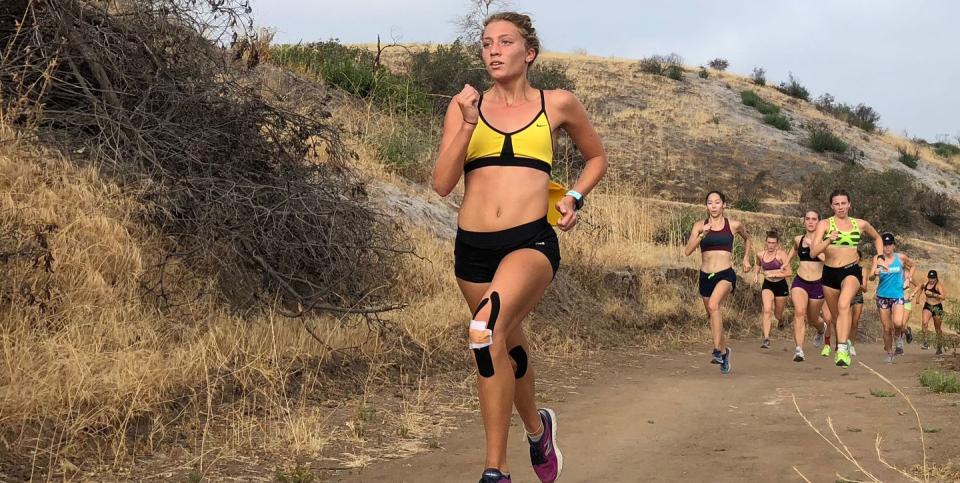Months after COVID-19 diagnosis, this runner is still struggling with symptoms

COVID-19’s affect on your health is a rapidly developing situation. For the most up-to-date information, check in with your local health officials and resources like the Centers for Disease Control and Prevention (CDC) in the US or gov.uk in the UK regularly.
One sign that runner Natalie Hakala is making progress in her recovery from COVID-19: She can finish her sentences now. Just a few weeks ago, she would have to stop after a few words to catch her breath.
The struggle to hold a conversation is just one of the problems Hakala, 22, has experienced in the two months since she was diagnosed with COVID-19. She’s what’s known as a COVID-19 'long-hauler,' someone whose symptoms persist for weeks or months. Hakala described having a rapid heart rate, brain fog, and consistent headaches unlike any headache she’s had before.
'It’s directly behind my eyes,' she told Runner’s World. 'Normally you can push on your temples or the back of your neck to relieve the pressure. It’s behind my eyeballs, straight back there. My face feels puffy, if that makes sense.'
Hakala—a talented distance runner with a best time of 2:17 in the 800 meters—was finishing up her senior year at Division II Concordia University in Irvine, California, when the school shut down in March because of the coronavirus pandemic. Instead of starting her final track season, she went home to Eugene, Oregon, where she has been living with her parents and younger brothers. She followed recommendations from the CDC and quarantined from her family for two weeks when she arrived home. She finished her classes online and graduated virtually, while avoiding contact with anyone outside her family.
In early July, she and five other college friends went camping in the woods about an hour from Eugene, as a way to celebrate their graduation, thinking it was the safest way to get together. But soon after they returned home, one of the six, who had traveled from Seattle, tested positive for COVID-19.
On July 5, Hakala lost her sense of smell. Her sense of taste went a couple of days after that. Then her fever spiked—so she went back to quarantine. She spent two weeks mostly outside lying in a hammock, while her family stayed six feet away and wore masks around her.
Ultimately, five of the six people on the camping trip tested positive. But only Hakala has experienced lingering symptoms.
Two weeks after her positive test, when Hakala was no longer contagious and her fever had broken, she tried to go for a short run. She made it about 100 yards before stopping to walk, because her chest felt tight and her heart was racing.
Hakala tried to return to work at an orthopedics practice, where she’s a cast technician. Even though she was working a shorter-than-usual schedule, she struggled. She had to take the elevator instead of the stairs. One day, the simple process of casting a patient’s arm left her out of breath for 30 minutes after. She remembers thinking how it was not normal.
'I’d go home at the end of the day, feeling super uncomfortable and take an hour- or two-hour nap,' she said.
At about 6 a.m. on August 16, Hakala awoke with severe chest pains. She said it felt like someone was sitting on her chest at the same time as something was pushing outward on her rib cage. She woke her mother, a physician assistant, and they went to the emergency room.
Your oxygen saturation is considered normal between 95 and 100 percent. Anything below 90 is considered low. Hakala’s was at 79. She was admitted to the hospital and stayed for three nights. She was diagnosed with costochondritis (inflammation of the cartilage in the rib cage), pericarditis (inflammation of the membrane surrounding the heart), and pleurisy (inflammation of the tissue surrounding the lungs).
A few weeks after her hospital stay, Hakala is starting to see improvements, although hazardous air quality from nearby wildfires is making it hard for her to breathe again. Running, or any sort of exercise, is still a ways off, but her experiences as a runner are helping her cope.
'I think it’s going to be insanely slow and kind of frustrating,' she said. 'That’s kind of how running is—you get a one-second PR after months of training.'
After coming back from a long hip injury that curtailed her running at the end of her high school days and beginning of college, she developed patience. That long view is also helping her through recovery.
'I’m used to having to do the little things correctly and focusing on what I can control,' she said. 'I’m just trying to do those same things now. I do deep breathing exercises. I know resting is going to be my best friend.'
In a Facebook post her mother, Christy Hakala, wrote, she urged doubters to take the virus seriously.
Hakala encourages others to avoid her mistakes. 'We could have taken more precautions,' she said, of the ill-fated camping trip. 'I was taking [the virus] seriously. But you always think it’s not going to happen to you. You think, "There’s no way my friends have it." We should have all gotten tested before.'
Some days, Hakala feels bummed out—why does making a cup of decaf coffee in the morning make her tired? Other days, she’s grateful that she’s getting better slowly and that no one else in her family got sick.
'I get wanting to have everything be fixed and seeing all your friends,' she said. 'But at the same time, I would never want this to happen to someone else. Understand the risk isn’t worth the reward.'
You Might Also Like

 Yahoo News
Yahoo News 